AI solutions
What we do
Services
Experts in
How we work
The SaaS industry has been showing steady growth for the last decade and shows no sign of slowing down. In 2023, even with the overall startup investment decline, 47% of overall venture capital funding (around $567 billion) was allocated to SaaS startups. With growing investment in Software-as-a-Service, exciting SaaS startups continue to pop up every day.
In Clockwise Software, we have provided SaaS application development services for 10+ years and have created more than 25 SaaS applications across several industries, with 6 more in different stages of development. Closely monitoring and analyzing leading SaaS companies and promising newcomers is part of our job, and we are eager to share with you the startups that show the most promise, in our opinion. Using our significant experience with the SaaS business model, software development, and industry trends, we composed a list of fastest growing SaaS companies that are worth your attention.
It is crucial to establish a clear set of criteria for the list, to make sure that all startups included in our list fully deserve to be there. Here are the main factors we took into consideration while choosing top high-growth SaaS startups:
Based on these criteria, we’ve identified the ten best SaaS startups that have great ideas behind them and align with key industry trends. We update this list of top SaaS companies in the USA, Canada, and Europe every year so you can be sure that the startups we choose are active and showing admirable growth right now. Read our list of top SaaS startups (2024) to watch and analyze some of the ideas and approaches that bring the SaaS market forward. In the end, we will pinpoint what trends will shape the SaaS industry in the near future based on the top growing SaaS companies.
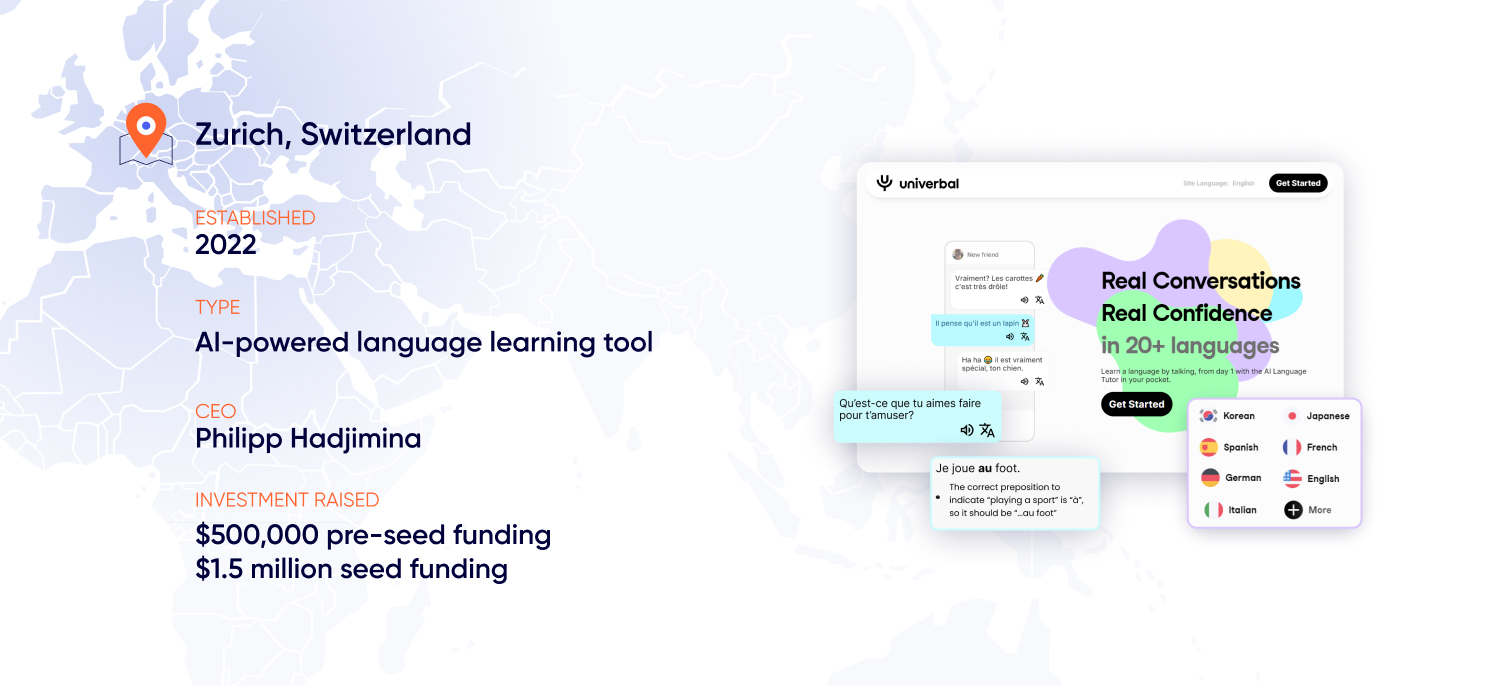
Univerbal (previously called Quazel) is a SaaS application created for language learners who wish to sharpen their skills through conversations. While finding a qualified tutor or native speaker to practice with can be difficult and expensive, Univerbal offers a tool for engaging in unscripted conversations with AI in 21 languages.
The company was founded in 2022 by three former students at ETH Zurich, one of the best technical universities in Europe. All three co-founders, Philipp Hadjimina, David Niederberger, and Samuel Bissegger, have previous experience in the computer science field. Philipp Hadjimina serves as Univerbal’s CEO, David Niederberger is a CTO, and Samuel Bissegger is in charge of the product development team.
Univerbal leverages large language models, such as ChatGPT, to create fluid, dynamic conversations, unlike older language learning apps that rely on predetermined scenarios. One of the key challenges the founders faced was adapting these models so beginners would receive simpler responses and advanced users would engage in dynamic conversations with more complex topics.
After receiving $500,000 of pre-seed funding from famous startup accelerator Y Combinator, known for helping launch some of the biggest companies in US, Stripe, Dropbox, and Airbnb, Univerbal launched its product. In the first two days, the SaaS startup attracted more than 50,000 users. In 2023, the company received around $1.5 million of additional funding from the well-known venture capital firm Khosla Ventures.
In spring 2024, the company was rebranded and changed its name from Quazel to Univerbal. The startup’s product is available for both iOS and Android and has been downloaded more than 100,000 times.
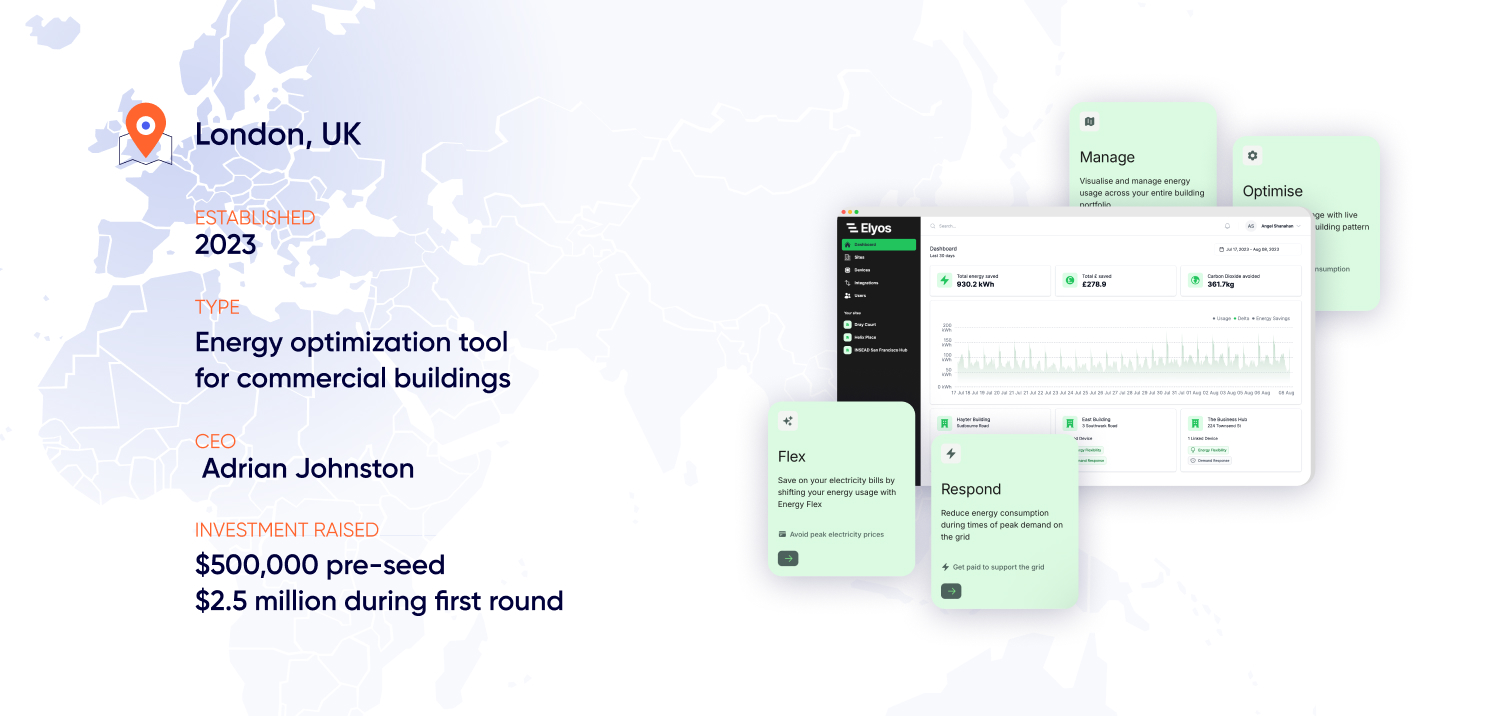
Elyos Energy helps businesses to reduce carbon emissions and save costs by optimizing energy consumption. This SaaS tool connects to HVAC systems, smart thermostats, batteries, and other IoT devices to automatically lower energy usage during peak hours.
One of the main goals of Elyos Energy as a company is to assist the UK government in its net zero strategy. By 2035, the country plans to completely decarbonize the energy sector and focus on renewable and nuclear energy. However, this approach leads to a volatile balance between supply and demand, which can be solved with the company’s software providing energy flexibility.
Customers can monitor their energy consumption in real time, create their own automated schedules, and optimize connected devices using SaaS and cloud platforms, reducing electricity usage during peak grid strain. By shifting 10% of peak time energy usage, Elyos Energy can save companies up to 15% of their electricity bills and reduce their carbon footprint by 7%.
Elyos Energy's CEO, Adrian Johnston, is a well-known figure in the green energy world and has previously created a very successful company, Una Brands, that specializes in acquiring and scaling e-commerce businesses, reaching $70 million in annual revenue. Established in 2023, Elyos Energy startup received $500,000 of pre-seed funding from Y Combinator and $2.5 million during the first funding round after releasing SaaS MVP. In addition to clients in the UK, recently, Elyos Energy expanded and started working with a client in Amsterdam.
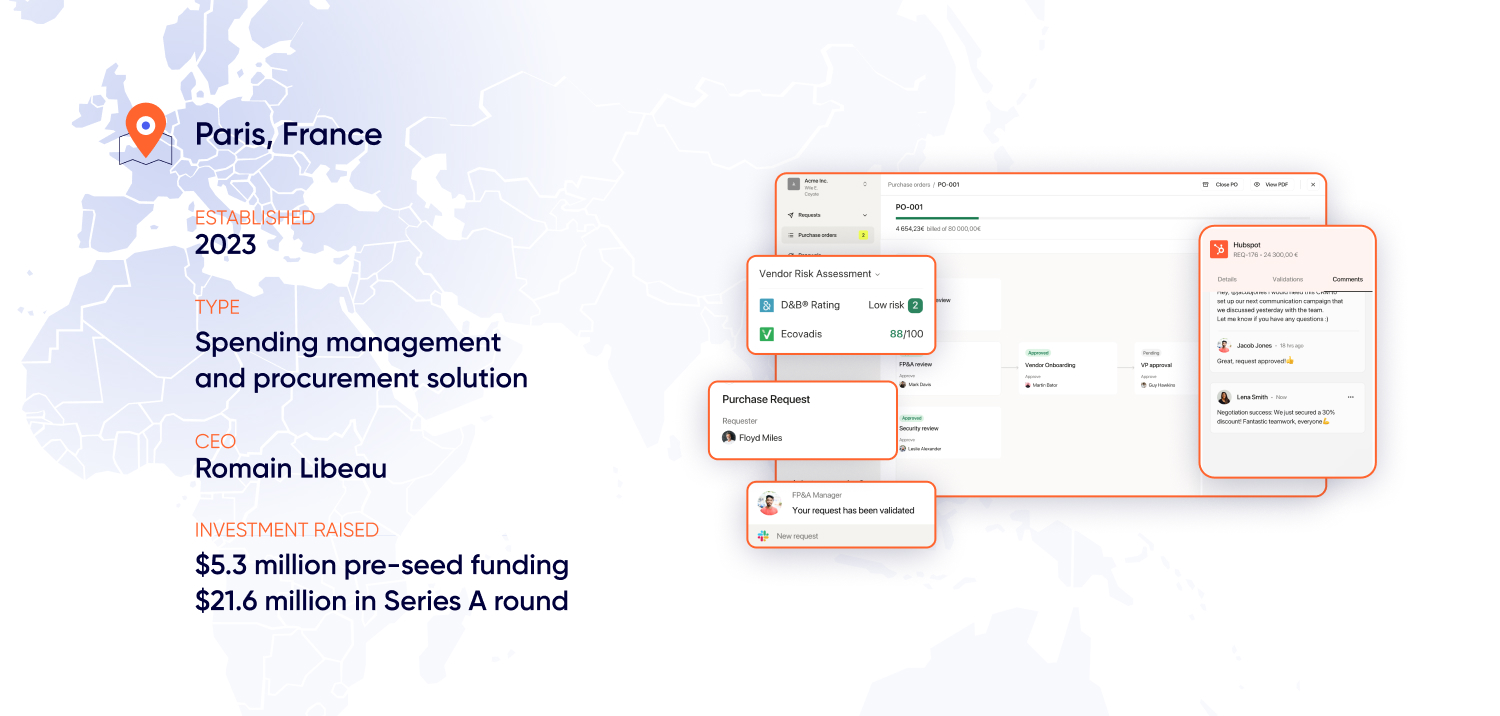
Pivot is a SaaS app aimed to revolutionize the procurement process. While many organizations use legacy systems or ERP software as procurement solutions, this French startup offers AI-based functionalities and advanced features that can help companies keep their spending under control even during rapid growth.
In addition to AI-powered automation features, Pivot offers impressive integration capabilities. The tool integrates with SaaS CRM, HR systems, accounting software, communication tools, and ERP software, ensuring seamless workflow and efficient spend management.
One of the top B2B SaaS startups was created in 2023 by three experienced co-founders. CEO Romain Libeau was one of the first team members at employee experience platform Swile, president Marc-Antoine Lacroix spent several years at fintech company Quonto, and CTO Estelle Giuly was a software engineering team leader in such enterprises as Wave and Nuxeo.
Even though US-based SaaS startups Zip and Levelpath already offered business solutions for user-friendly and efficient procurement management and attracted tens of millions in funding, Pivot found its niche. The application aligns with European compliance regulations and works better with the local payment ecosystem, so companies from France and other EU countries prefer this product.
In April 2023, Pivot raised $5.3 million in pre-seed funding and started working on the company's tool over the summer. After the launch of the first integration in September and positive feedback from first adopters, the Paris-based company received an additional $21.6 million in a Series A round without involving additional investors.
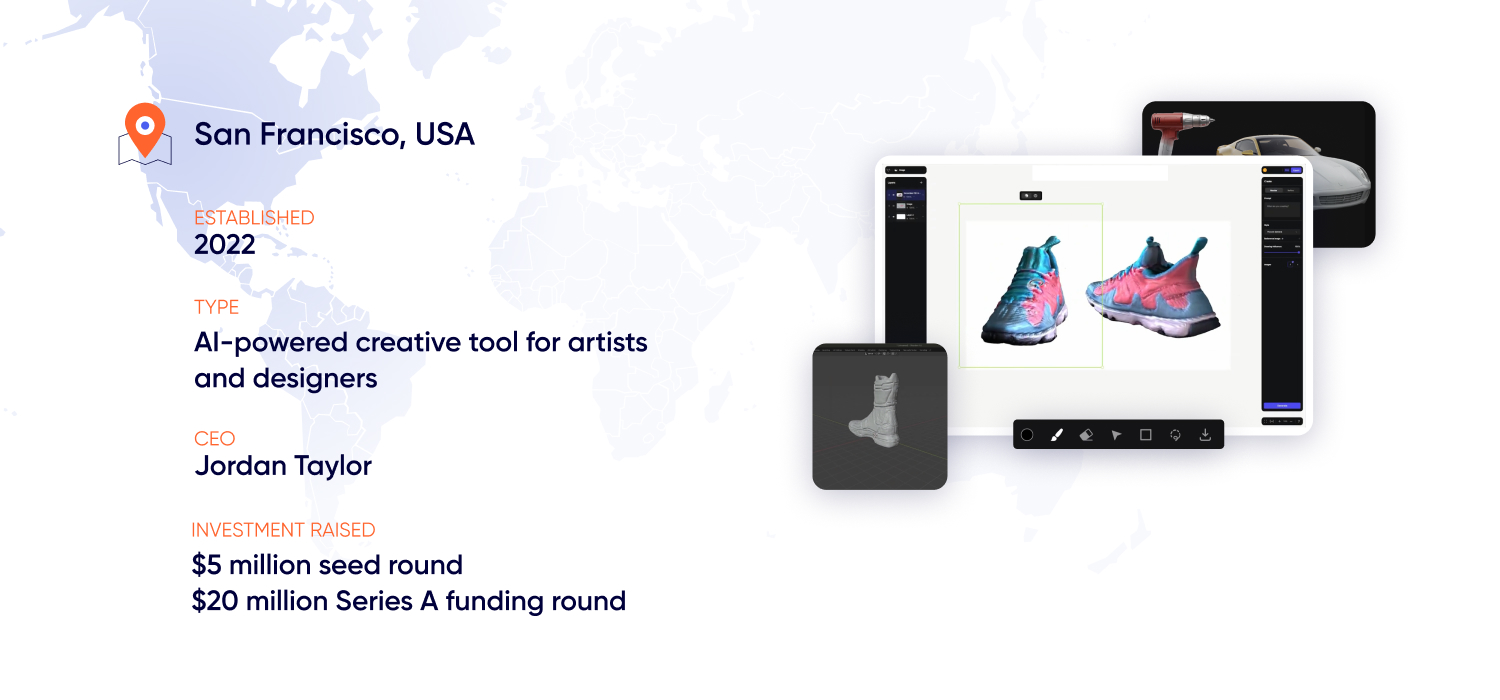
Vizcom is one of the top SaaS startups catering to designers' needs. The application can easily transform simple sketches into photorealistic renders in seconds. This feature can boost designers’ productivity and efficiency and revolutionize the way product concepts are visualized.
In addition to core features, Vizcom provides an intuitive interface for sketching, importing 3D models, and using natural language commands for refining designs. Also, the platform features collaborative workspaces. Vizcom offers several pricing plans, including a free tier with limited capabilities, so you can test an application before paying $19 a month for an individual pro plan.
Co-founder and CEO of Vizcom Jordan Taylor worked as an industrial designer at Honda and NVIDIA before starting the company in 2022. Second co-founder and CTO Kaeland Richard has a background as a software engineer and previously worked at United Wholesale Mortgage.
In January 2023, San Francisco-based startup secured a $5 million seed funding round and launched a SaaS platform using these investments. After its’ sketch-to-render tool quickly gained traction in the designers’ community, in March 2024, Vizcom announced a significant milestone with a $20 million Series A funding round.
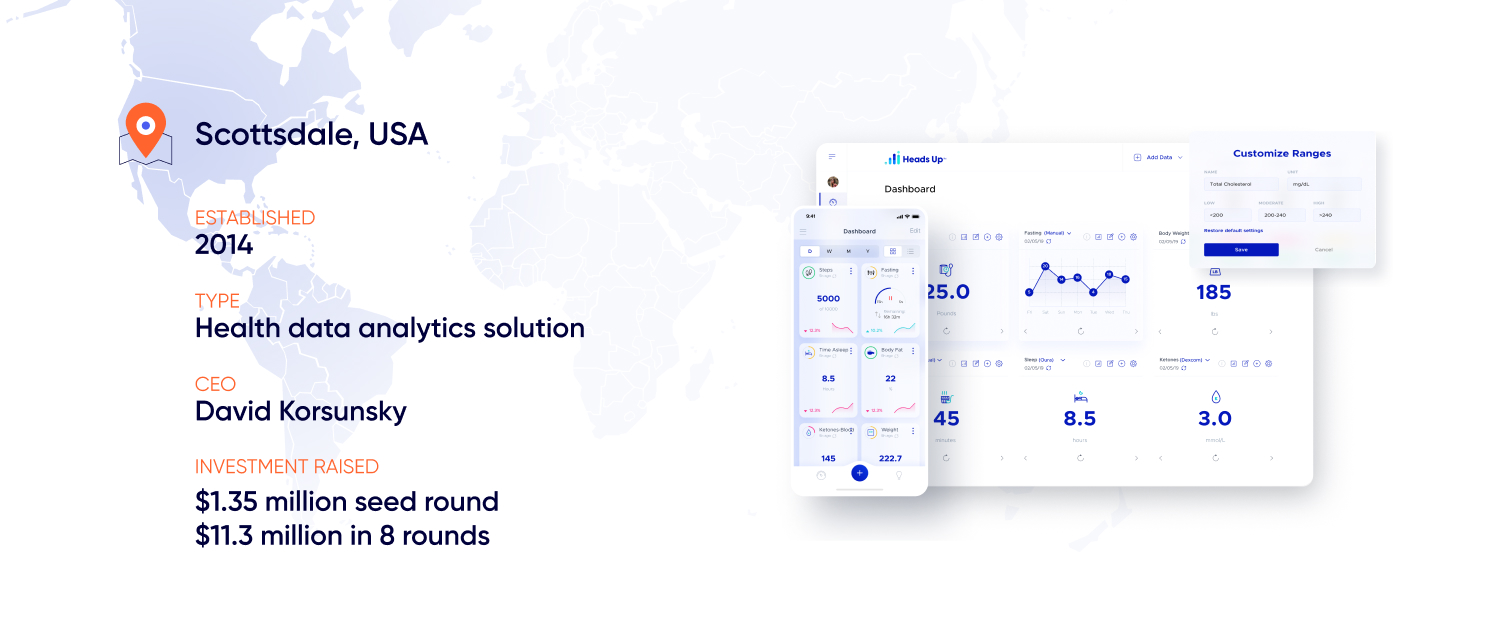
Heads Up is one of the top SaaS companies in USA, located in Scottsdale, Arizona, and focused on health data analytics. The company provides a centralized platform for easily tracking and analyzing health data. Back in 2014, Heads Up started as a basic platform for tracking metrics from various sources, such as wearable devices and medical labs. Now, after several funding rounds and years of continuous development, Heads Up has become a leading health analytics platform with a wide range of advanced features.
Today, in addition to health data aggregation, Heads Up offers clients customizable dashboards, adherence and engagement reports, advanced trend analysis, real-time remote patient monitoring, specialized modules for ketogenic therapy and diabetes management, and educational resources for medical professionals. The company constantly works on new partnerships and integrations, so today, clients can sync their medical records from over 20,000 healthcare providers across the USA.
One of the top B2C SaaS companies was founded by David Korsunsky, who previously worked as a systems engineer, technical consultant, and director of strategic alliances in various tech companies. David decided to create a centralized health data platform after unsatisfactory personal experiences with accessing and tracking his own health.
In November 2020, Heads Up Health raised $1.35 million in a seed round led by Innosphere Ventures. Following the successful expansion of the platform, Innosphere Ventures invested an additional $2.25 million. In following years, Heads Up gathered additional funding through several rounds, with the latest one, in January 2024, being estimated at $6 million. Clockwise Software is a part of the team behind this successful startup, working on front-end and testing. Heads Up tech team constantly works on new features, such as video calls between doctors and patients, and on the app’s localization for accessing new markets.
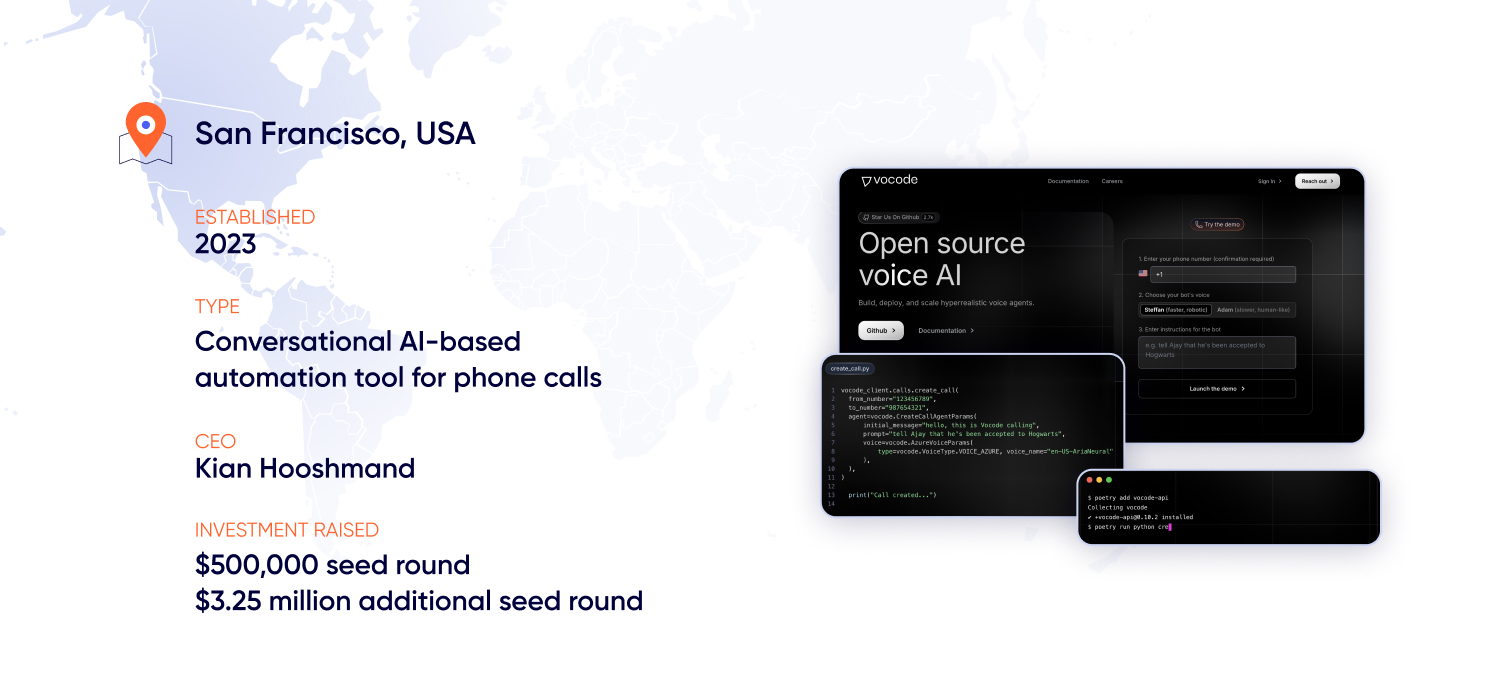
Artificial intelligence plays a big role in automating customer support, but today, companies mostly use text-based chatbots and virtual assistants. Creating a tool that can understand and analyze human speech while generating responses using synthetic speech in real time is rather difficult. SaaS startup Vocode tries to change this by providing open-source voice AI that can be used for inbound and outbound calls.
The company was founded in 2023 in San Francisco by two UC Berkeley alumni with backgrounds in software development and AI technologies: Ajay Raj and Kian Hooshmand. Initially, Vocode was known for creating PrankGPT, an AI-powered tool created specifically for prank calls. After some time, they decided to shift towards other areas of AI implementation due to ethical concerns and use the same technology behind PrankGPT to help businesses make customer support more efficient and cost-effective.
In April 2023, Vocode received initial funding through a seed round that helped kickstart the company's operations. In February 2024, the startup raised $3.25 million through another seed round. Among the main investors are Y Combinator and prominent venture capital firm Accel. Recognition from such big industry players shows that Vocode is not just a company known for revolutionizing prank calls but a SaaS startup with a bright future.
While fully replicating human customer support professionals with AI is still a challenging task, Vocode’s team constantly makes their tool better and plans to use fresh funds for new features and enhancing performance. Today, many companies have decided to partner with Vocode to reduce customer support costs while providing 24/7 availability. With a free plan, anyone can test this conversational AI and decide if it is the right fit.
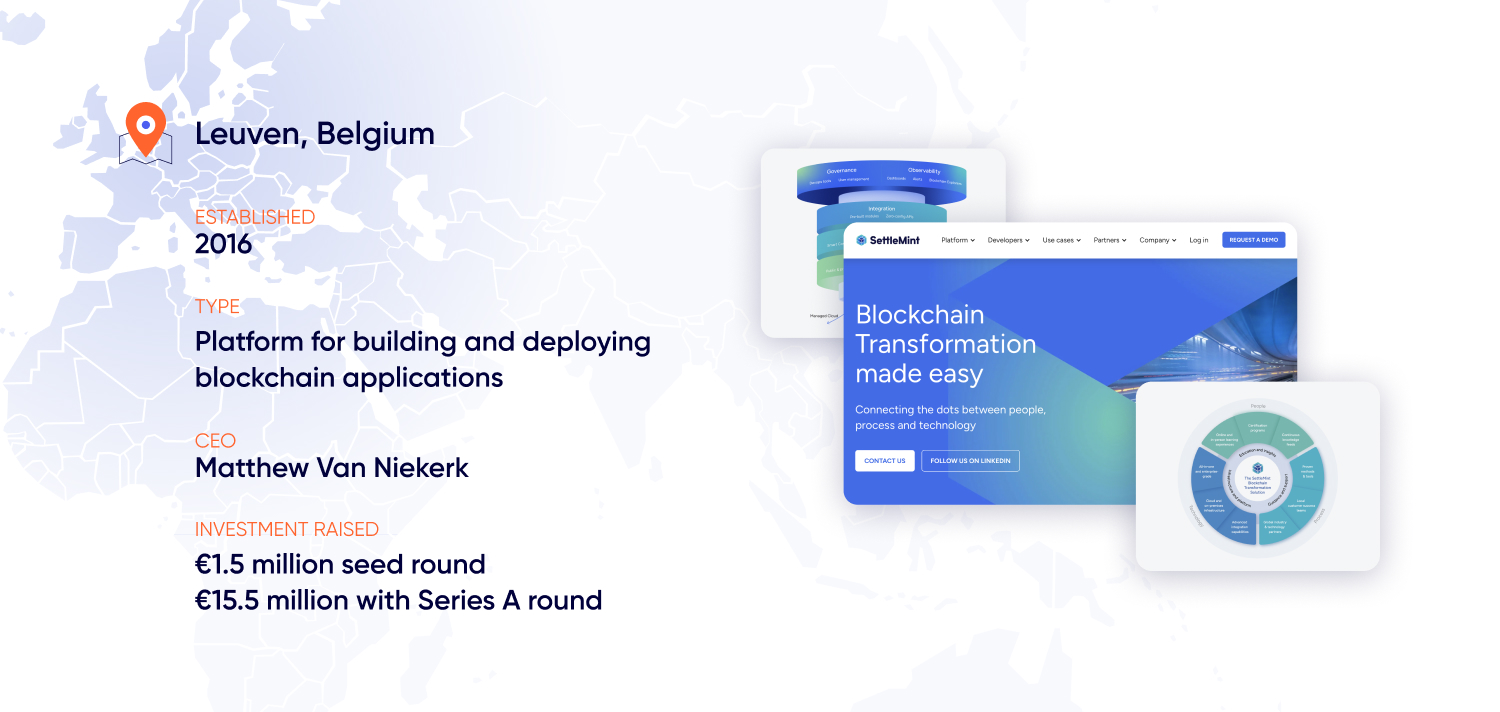
SettleMint is a SaaS-based company that helps businesses around the world to adopt and deploy blockchain applications without significant spending on tech experts and lengthy development. With an easy-to-use low-code platform, organizations can easily build and manage blockchain applications. SettleMint offers several tools and a variety of templates for any client to quickly develop apps for asset tokenization, smart contracts, supply chain transparency, or digital identity.
Both SettleMint co-founders, CEO Matthew Van Niekerk and CTO Roderik Van der Veer, have impressive experience. Before creating SettleMint, Van Niekerk worked as an investment manager, financial services strategic consultant, head of innovation, and COO in various European companies. Van der Veer previously worked as a software developer, IT project manager, and CTO in different Belgian organizations.
SettleMint was founded in 2016 in and received €1.5 million during a seed round of investment, mostly by KPN Ventures, a well-known investing firm in Europe. With that investment, the company took its time developing a platform and acquiring its first clients before gathering $15.5 million with a Series A round of investment in 2022. With these funds, SettleMint started a new phase of the SaaS product lifecycle, scaling its operations and entering untapped markets.
In recent years, SettleMint opened new offices in India, Japan, UAE, and Singapore, in addition to headquarters in Leuven, Belgium. Currently, the company has more than 100 clients and continues to expand. The SaaS startup constantly receives additional funds through governmental grants and financial support from innovation programs. With the growing importance of blockchain technology, SettleMint’s platform will probably become even more in demand in the near future.
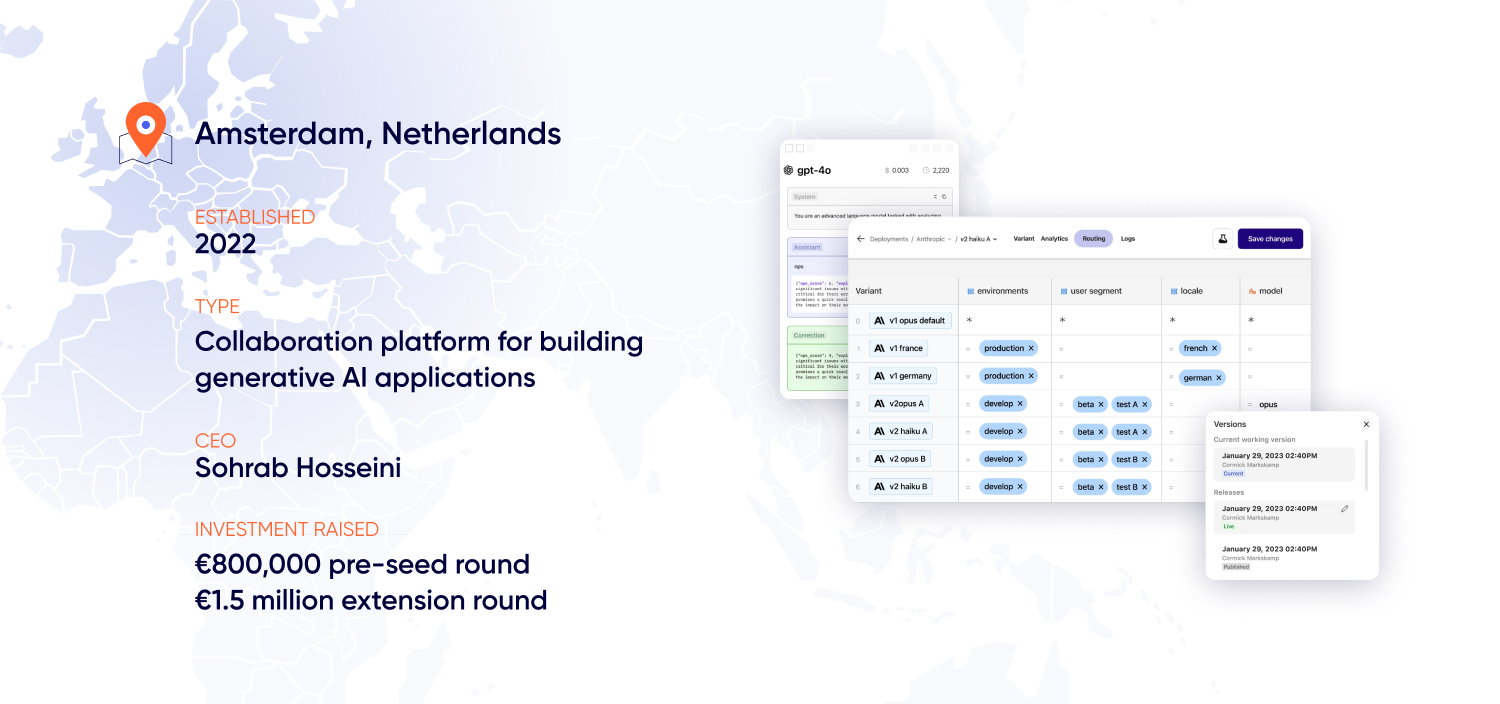
Generative AI is used for numerous tasks by companies around the world, and Orq.ai offers an impressive set of features for integrating and managing large language models (LLM). This SaaS startup from Amsterdam provides tools for prompt management, experimentation, and real-time analytics.
Established in 2022, Orq.ai currently supports more than 75 AI models, and this number is constantly growing. Technical and non-technical professionals can collaborate during the management and deployment of LLM models. Orq.ai tools allow users to experiment with prompts in controlled test environments, set up security guidelines and privacy controls, and curate datasets used by generative AI.
The company’s co-founder and CEO, Sohrab Hosseini, worked as COO and CTO in several B2B SaaS companies and as technology transformation lead at McKinsey & Co. Second co-founder Anthony Diaz worked as a software development team lead and lead architect in several European companies.
Orq.ai is the first European all-in-one generative AI platform for LLM integration. After a pre-seed funding round of €800,000 in September 2023, the company secured an additional $1.5 million during the extension round. This money was used to launch two new products called Experiment and Optimize. Co-founders announced that with new investments, Orq.ai plans to expand to Germany, Belgium, and Luxemburg.
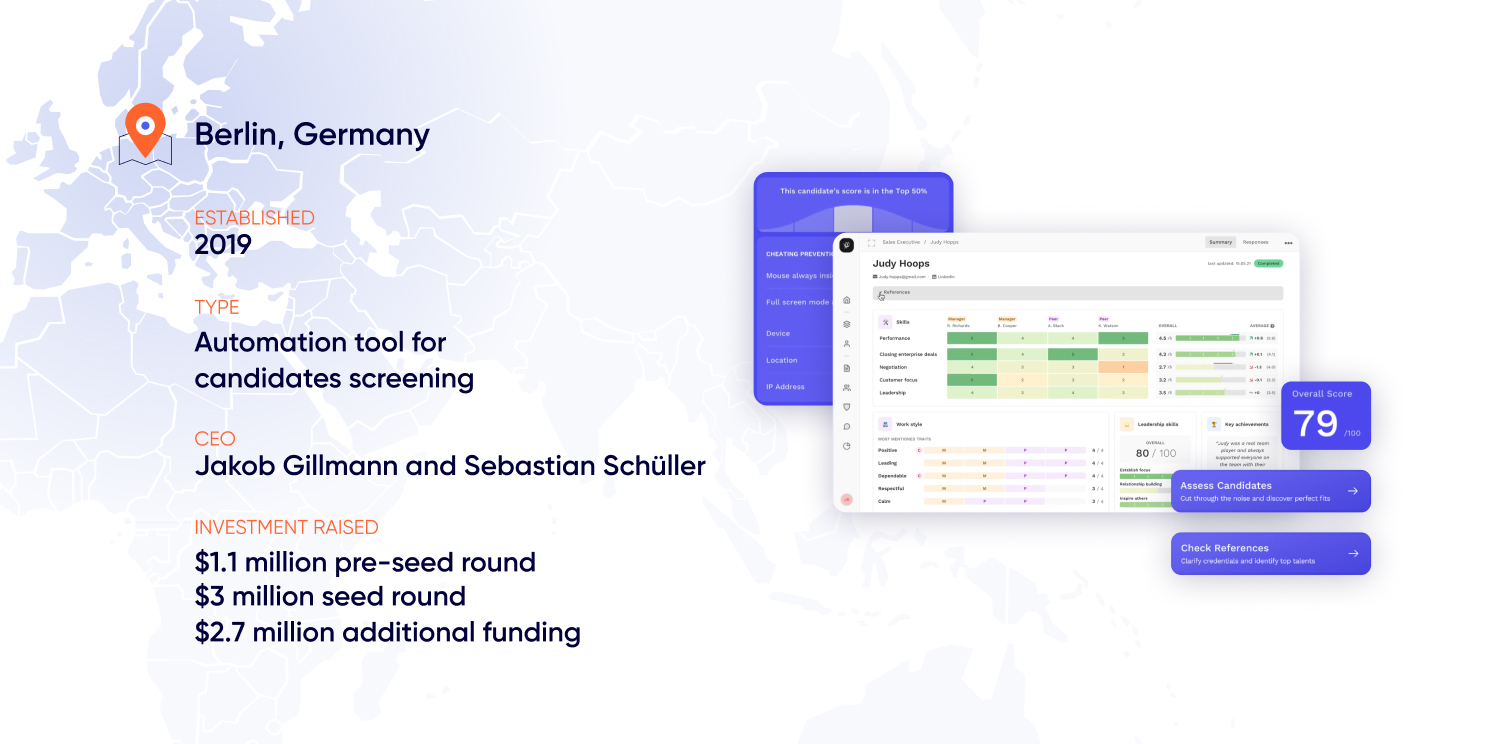
Today, many organizations spend too much resources on talent acquisitions, and HiPeople aims to solve this issue. This Berlin-based SaaS startup is focused on enhancing the hiring process with AI-powered recommendations, automated reference checking, and tailored assessments. HiPeople allows companies to save up to 90% of candidate screening time and significantly cut HR department costs.
HiPeople can quickly contact and gather feedback from candidate's references, later generating detailed reports with summarized feedback, candidate’s strengths, and areas for improvement. This feature allows companies to check references in less than 24 hours and quickly close top talent while saving time and money in the process.
Also, the platform offers more than 1,000 job-specific assessments and 400+ tests across hard skills, personality, soft skills, cognitive abilities, and culture. Clients can tailor assessments and add video questions. HiPeople generates detailed reports based on results in real time and helps companies to compare candidates quickly.
HiPeople was founded in 2019 by Jakob Gillmann and Sebastian Schüller, both serving as the company’s managing directors. Gillman has an extensive background in product development and startup scaling, having previously worked as a marketing specialist, analyst, investment manager, and head of growth for various companies. Schüller also acquired experience in marketing, business development, and investment management before working as a growth strategist at Google.
In 2019, before the SaaS product launch, HiPeople received $1.1 million from various investors, which was used for initial development and fine-tuning the platform before going to the market. In 2021 during the seed round, the startup raised $3 million from several venture capital firms and angel investors. These funds were mostly used for marketing and customer acquisition. In 2022 and 2023, HiPeople continued to receive additional funding, approximately $2.7 million.
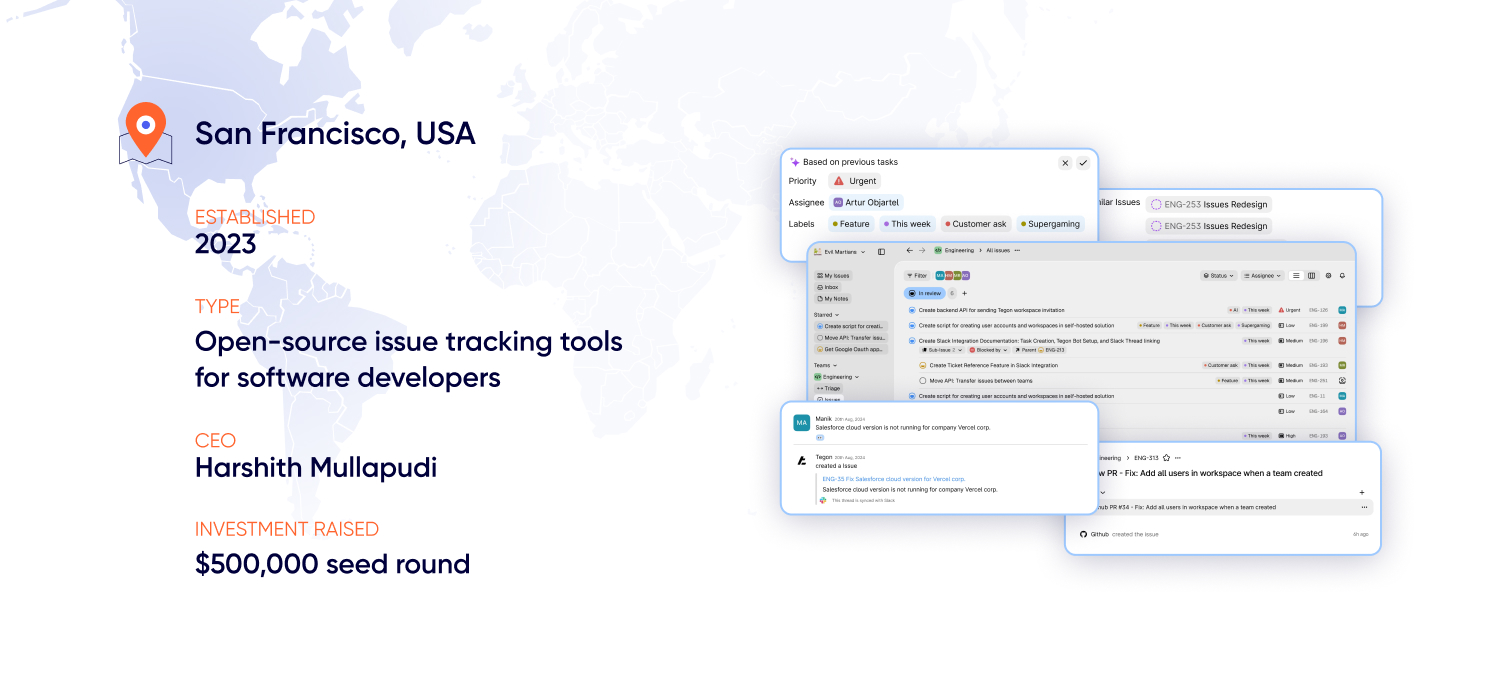
There are numerous issue-tracking tools available today, such as Jira, Bugzilla, or Zoho BugTracker. It seems difficult to enter such a saturated and competitive niche. However, micro SaaS startup Tegon offers a new approach to issue tracking during software development, providing an open-source platform with simple design and AI-powered automation capabilities.
The company was founded in 2023 by three experienced software developers: Harshith Mullapudi, Manik Aggarwal, and Manoj Reddy. All three have previously worked for the fintech company Velocity, which provides revenue-based financing to startups. Initially, Mullapudi, Aggarwal, and Reddy worked on another startup idea backed by Y Combinator but later pivoted towards project management and issue-tracking tool development. Tegon co-founders talk about their dissatisfaction with modern tools, calling them too complex and bloated.
Tegon leverages AI capabilities to automate numerous routine and time-consuming tasks. The open-source nature of this platform provides many customization options that can help engineering teams optimize their workflows. Tegon also offers advanced functionalities for task prioritization and contextual tracking. The simplified user interface is intended to reduce the learning curve and encourage even less tech-savvy team members to use Tegon. Tegon can be integrated with GitHub and Slack.
In January 2023, Tegon received $500,000 from startup accelerator Y Combinator. Since then, with a team of 5 members, this company from San Francisco worked on developing platform scaling operations. Founders are open about their plans to create full-fledged project management software down the road, so the issue tracking tool is just the beginning of Tegon’s journey.
This list of top SaaS startups clearly illustrates growing industry trends. Many high-growth SaaS companies are heavily focused on using AI as the foundation of their products, such as Univerbal, Vocode, Vizcom, or HiPeople. Other successful SaaS startups implement AI-powered features to enhance user experience and stay competitive.
Orq.ai and SettleMint provide low-code/no-code platforms for simplifying complex technologies for broader user adoption, while Tegon offers a simplified user interface and basic design that won’t confuse newcomers. We can see that top B2C SaaS companies try to make it easier for businesses to implement and manage complex technologies without needing deep technical expertise.
The success of Elyos Energy demonstrates the growing importance of sustainability and energy efficiency in the SaaS market. It aligns with broader global sustainability trends, and we can expect to see more SaaS top companies with similar values.
Finally, almost every SaaS startup in our list is focused on creating highly specialized tools tailored to specific markets or problems. With this trend, we see a shift towards niche products that solve the very specific pain points of target audiences. In a saturated and highly competitive SaaS market, developing a niche solution with a killer feature is one of the best ways to succeed.
We will continue to monitor the SaaS market and update this list so you stay informed about the best SaaS companies and the key trends they reflect. This information can be very useful if you want to start your own company, go through SaaS migration, or just interested in Software-as-a-Service market. In this article, we just scratched the surface of the biggest trends illustrated by top SaaS companies (2024). Read our detailed breakdown of the hottest SaaS industry trends and learn what technologies and approaches will determine what the Software-as-a-Service market will look like in the next few years.
